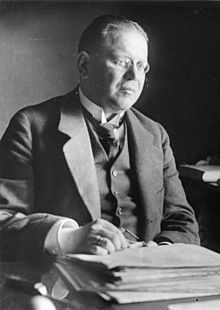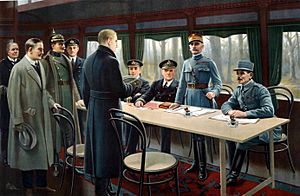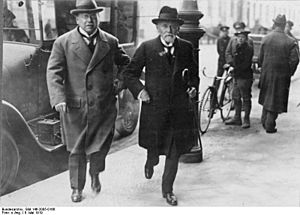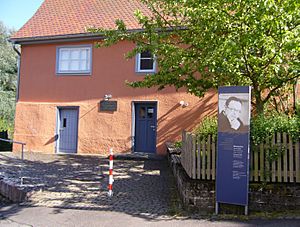Matthias Erzberger facts for kids
Quick facts for kids
Matthias Erzberger
|
|
|---|---|

Erzberger in 1919
|
|
| Vice-Chancellor of Germany | |
| In office 21 June 1919 – 3 October 1919 |
|
| Chancellor | Gustav Bauer |
| Preceded by | Bernhard Dernburg |
| Succeeded by | Eugen Schiffer |
| Minister of Finance | |
| In office 21 June 1919 – 12 March 1920 |
|
| Chancellor | Gustav Bauer |
| Preceded by | Bernhard Dernburg |
| Succeeded by | Joseph Wirth |
| Minister without portfolio | |
| In office 9 November 1918 – 20 June 1919 |
|
| Minister-President | Friedrich Ebert (de facto) Philipp Scheidemann |
| Serving with | Eduard David Georg Gothein |
| Member of the Reichstag for Württemberg |
|
| In office 24 June 1920 – 26 August 1921 |
|
| Preceded by | Constituency established |
| Succeeded by | Hermann Eger |
| Member of the Reichstag for Württemberg 16 |
|
| In office 3 December 1903 – 9 November 1918 |
|
| Preceded by | Gebhard Braun |
| Succeeded by | Constituency abolished |
| Personal details | |
| Born | 20 September 1875 Buttenhausen, Württemberg, German Empire |
| Died | 26 August 1921 (aged 45) Bad Griesbach, Baden, Germany |
| Political party | Centre Party |
| Occupation | Politician |
Matthias Erzberger (born September 20, 1875 – died August 26, 1921) was an important German writer and politician. He was a member of the Centre Party, a political group mainly supported by Catholics. From 1919 to 1920, he served as the Minister of Finance for Germany.
Erzberger became well-known for speaking out against World War I starting in 1917. He was chosen to represent the German government and signed the armistice (a peace agreement) between Germany and the Allied Powers. Sadly, he was killed in 1921 by a right-wing terrorist group called Organisation Consul.
Contents
Early Life and Career
Matthias Erzberger was born on September 20, 1875, in Buttenhausen, a small town in what was then the Kingdom of Württemberg. His father was a tailor and postman. Matthias went to schools in Schwäbisch Hall and Bad Saulgau, finishing in 1894. He then became a primary school teacher. While teaching, he also studied law and economics in Switzerland.
Two years later, he started working as a journalist for a Catholic newspaper in Stuttgart. He also wrote articles on his own. Erzberger joined the Catholic Centre Party. In 1903, he was elected to the German parliament, known as the Reichstag. He quickly became a leader in his party. He focused on topics like colonial policy (how Germany managed its colonies) and financial policy. He helped with important money reforms in 1909. By 1912, he was part of the party's main leadership group. He supported building up Germany's military in the years before World War I.
In 1900, he married Paula Eberhard. They had three children together.
Role in World War I
At first, like many others, Erzberger supported Germany joining World War I. He even wrote a plan in 1914 about Germany's war goals, suggesting Germany should take over parts of Belgium and France. At this time, he was a key helper to the German leader, the Chancellor Theobald von Bethmann Hollweg. Erzberger was in charge of spreading information about Germany's side of the war, especially to Catholic groups. He also took part in some diplomatic talks, like trying to stop Italy from joining the war in 1915.
Erzberger also worked to improve how the government was run. In 1916, he helped pass the Auxiliary Services Act. This law made sure that all men not fighting in the war or working in certain jobs had to work in jobs important for the war effort. It also recognized trade unions (groups of workers) as equal partners with employers.
Erzberger was one of the few German politicians who tried to help Christian groups in the Ottoman Empire during the war. He traveled to Constantinople (now Istanbul) in 1916 to talk with the Ottoman leaders. He prepared a report about helping Christians in Turkey, but the Ottoman government did not act on it.
By 1917, the war was stuck, with neither side winning easily. Erzberger changed his mind about the war. He became a strong opponent of "unrestricted submarine warfare," which meant sinking ships without warning. In July 1917, he gave a speech in the Reichstag. He asked the government to give up its goals of taking new land and to try to end the war through talks. He also spoke about how weak the German military was. His speech helped lead to the creation of a special committee of different political parties. This committee wanted to give more power to the parliament.
On July 19, Erzberger called for a vote on the Reichstag peace resolution. This resolution asked for peace without taking land or money from other countries. It passed with many votes. Erzberger's main goal was to convince the Social Democrats (another political party) to keep supporting war loans while peace talks were happening. He became a very powerful politician in Germany. Many people, especially those who were struggling, liked him because he tried to end the war peacefully. However, many rich and powerful people who wanted Germany to gain more land hated him.
Signing the Armistice

On October 3, 1918, Erzberger joined the government as a Secretary of State. On November 6, 1918, he was sent to negotiate with the Allied powers in France. The German leader, Prince Maximilian von Baden, thought Erzberger would be accepted by the Allies because he was a civilian and known for wanting peace.
However, the main Allied negotiator, Marshal Ferdinand Foch, was not willing to make many changes to the peace terms. On November 10, the German military leader Paul von Hindenburg and the new Chancellor, Friedrich Ebert, told Erzberger to sign the armistice.
As the head of the German group, Erzberger signed the armistice that ended World War I on November 11, 1918. He gave a short speech, saying the terms were very harsh. He ended by saying that a nation of seventy million people "can suffer, but it cannot die." Marshal Foch did not shake his hand and simply said, "Très bien" (very well).
After the War
After returning to Berlin, Erzberger agreed to lead the Armistice Commission, which was a very difficult job. He later became the Minister of Finance and Vice Chancellor in the new German government, led by Gustav Bauer. He supported the Treaty of Versailles, the peace treaty that officially ended the war. He believed Germany had no other choice. Because he signed the armistice and supported the treaty, many right-wing nationalists saw him as a traitor.
Erzberger successfully introduced new tax laws. In July 1919, he started what was called the "Erzberger finance reform." This reform had two main goals. First, it gave the German federal government the power to collect taxes and spend money. This ended the central government's reliance on individual states. Second, Erzberger wanted to make taxes fairer, reducing the burden on people with lower incomes. He introduced taxes on income and wealth, and the first German inheritance tax. In December 1919, a special "emergency" tax on wealth was added, which made many rich people very angry. In March 1920, a federal income tax followed. These high tax rates made Erzberger even more unpopular with many on the right.
Erzberger's tax reforms still influence Germany's tax system today. He helped stabilize the country's money, even though it was still strained by war payments. He also reformed the state railway systems, combining them into the German Reichsbahn. This new railway system started making a profit, which helped pay for war damages.
Erzberger had strong disagreements with right-wing political parties. He blamed the German National People's Party for the war. This led to a personal fight with their leader, Karl Helfferich. Helfferich published a pamphlet called "Get rid of Erzberger!" Erzberger sued Helfferich for slander (making false and damaging statements). The court case took place in Berlin in early 1920. Helfferich received a small fine. However, the court also said that some of Helfferich's claims about Erzberger's business dealings were partly true. Because of this, Erzberger had to resign from his government job and his seat in parliament in March 1920. During the trial, someone tried to assassinate Erzberger as he left the court.
Erzberger was elected to the Reichstag again in June 1920. However, he did not immediately take part in politics because he was facing charges of tax evasion. He later published a report explaining his actions during the war.
Erzberger's power came from his strong influence with Catholic workers in many parts of Germany. These workers had their own trade unions, which supported advanced social policies. Erzberger became their main voice in parliament. However, he faced strong opposition from conservative Catholics, some church leaders, and farmers in Bavaria. Erzberger was also a leader of the left-wing of the Centre Party. He once said, "Left is life, Right is death."
Erzberger continued to be hated by conservative and nationalist parties. This strong dislike was not just because of his foreign policy, like signing the armistice and supporting the Treaty of Versailles. It was also because of his financial policies. He was seen as suspicious for his tax reforms, which placed new burdens on wealthy people and landowners.
Assassination
The attacks in the conservative press became very extreme. One newspaper even hinted at his death. These attacks led to Erzberger's murder on August 26, 1921. He was killed in Bad Griesbach, a spa town in the Black Forest, while out for a walk. Many on the political right saw him as a traitor because he signed the armistice in 1918. Manfred von Killinger, a leader of an ultra-nationalist group, planned his killing. Two former naval officers, Heinrich Tillessen and Heinrich Schulz, carried out the murder. The killers were later smuggled into Hungary and were only brought to justice after World War II. Erzberger's funeral became a large political gathering. He is buried in the Catholic cemetery of Biberach an der Riss.
Legacy
Matthias Erzberger played a key role in preparing Germany for peace after World War I. He also helped the Catholic Centre Party, which later became the Christian Democratic Union, keep some power in a Germany that was becoming more extreme. His reforms in finance, government structure, and railways changed Germany. Erzberger was known for his optimism and sense of responsibility. He never gave up, even when faced with very hard tasks.
His most important, and tragic, legacy was signing the Armistice. Even though he was pressured by the military to sign quickly, this act was used for decades to support the Dolchstoßlegende (the "stab-in-the-back myth"). This myth claimed that Germany's surrender was a betrayal by civilians at home, especially by Socialist politicians, who supposedly undermined the German Army. Later, this myth helped Adolf Hitler rise to power and became a big part of Nazi propaganda. Because of his role, Erzberger was labeled one of the "November Criminals" by those who spread this myth.
Images for kids
See also
 In Spanish: Matthias Erzberger para niños
In Spanish: Matthias Erzberger para niños
 | Chris Smalls |
 | Fred Hampton |
 | Ralph Abernathy |





